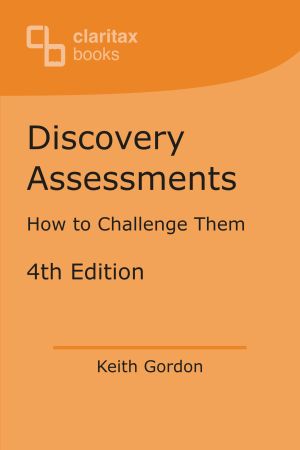Discovery Assessments: How to Challenge Them 4th ed
ISBN13: 9781912386918
Published: November 2023
Publisher: Claritax Books
Country of Publication: UK
Format: Paperback
The discovery assessment rules allow HMRC to raise an assessment up to 20 years after the end of the relevant tax year, vastly extending the normal four-year time limit (or six-year limit where there has been careless conduct).
As cutbacks at HMRC mean that fewer enquiries are being pursued, HMRC are increasingly relying on their powers to make discovery assessments. Frequently, however, HMRC overlook (and often fail even to mention) the statutory safeguards that are intended to protect taxpayers from challenges outside a formal self-assessment enquiry. It is only with a clear guide to the extent of HMRC’s powers that advisers can ensure that they protect their clients from inappropriate challenges.
The rules have been subject to considerable scrutiny by the tax tribunals, and the author of this title has been involved in many of the leading cases. His book provides tax advisers with a clear and comprehensive guide to the rules concerning discovery assessments and contains much practical advice explaining how such assessments may be challenged.
New for this edition:
- Wilkes comment on TMA 1970, s. 29 since introduction of self-assessment
- Concept of “relevant discovery”
- Marano re need for HMRC functions to be carried out by human agency
- Wilkes ruling that the subject matter of the discovery assessment must relate to the underlying discovery
- FA 2022 removal of anomaly re tax that “ought” to have been assessed
- Islam case re need for HMRC to use reasonable methods to demonstrate that there has been a discovery
- Wilby SDLT case re mismatch of information justifying a discovery assessment
- Upper Tribunal Norton comment on need to determine an assessment’s procedural validity at the time the assessment is made
- Discussion of whether a discovery assessment may be made during an enquiry window
- Corporation tax powers re surplus dual inclusion income
- Discovery provisions for digital services tax, public interest business protection tax and multinational top-up tax
- Ashe case re limits of retrospective legislation
- Kensall re HMRC misinformation about prospects of appeal
- Resolution of further “staleness” cases following Supreme Court ruling in Tooth
- New chapter re additional taxpayer safeguards when a return has been made
- Additional safeguards for other taxes (corporation tax, SDLT, ATED, digital services tax, public interest business protection tax, multinational top-up tax)
- Upper Tribunal Hargreaves case re carelessness not necessarily justifying a discovery assessment
- McCumiskey and Robson cases re returns made by fraudulent advisers without proper taxpayer authorisation
- Robson draws distinction between carelessness and fraudulent conduct
- Discussion of principle of careless conduct having to cause loss of tax (Bella Figura and Delphi)
- Further case law discussing carelessness in practice (including Kingdon, Rizvi and Altunis)
- CPR case re submission of document where taxpayer suspects it is inaccurate
- Further case law discussion of deliberate inaccuracies, including Quinns and Arthur
- Careless or deliberate behaviour in context of digital services tax, public interest business protection tax and multinational top-up tax
- Buckingham discussion re meaning of “enquiry” in context of discovery assessments
- McCumiskey and Sheth cases re imputation of information to hypothetical officer, and discussion of officer awareness of insufficiency
- Hargreaves discussion re prevailing practice
- Defences against discovery assessments in context of digital services tax, public interest business protection tax and multinational top-up tax
- Mullens case re HMRC only needing to show careless conduct if assessment within time limits
- Failure to notify chargeability (including HICBC) and Hextall case re meaning of reasonable excuse
- Scott case re extended time limits for offshore assessments
- Time limits for discovery assessments in context of digital services tax, public interest business protection tax and multinational top-up tax
- Wilby confirmation that FTT does not necessarily have to be able to identify the officer who made the discovery (but that should be rare)
- Upper Tribunal Birkett case dilutes principle that FTT may never consider arguments that would normally be considered under judicial review procedures
- Further case law discussions re burden of proof in discovery cases, including Kingdon and Hargreaves
- Problematic Civic case re supplementary claims and re claims affecting more than one period
- Consequential claims in relation to SDLT, ATED and certain other taxes
- Interaction between discovery assessments and investigatory powers for digital services tax, public interest business protection tax and multinational top-up tax
“An essential guide for any practitioner acting in cases involving discovery assessments, both scholarly and practical.” – TAXline review of first edition
